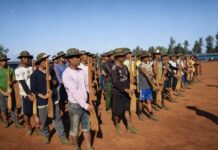ENAC Briefing No. 12
4 August 2015
The Ethnic Armed Organizations’ Senior Delegation (SD) and the Union Peacemaking Work Committee (UPWC) will meet in Rangoon later this week to negotiate the remaining critical issues in the Nationwide Ceasefire Agreement (NCA). To ensure the NCA is durable and sustainable, the SD seeks to resolve three core issues: all-inclusiveness, matters of the signatories, and international witnesses.
All-inclusiveness: The SD’s position is to include at least all seventeen SD member organizations as signatories to the NCA: the Arakan Army (AA), Arakan Liberation Party (ALP), Arakan National Council (ANC), All Burma Students Democratic Front (ABSDF), Chin National Front (CNF), Democratic Karen Benevolent Army (DKBA), Kachin Independence Organization (KIO), Karenni National Progressive Party (KNPP), Karen National Union (KNU), Karen Peace Council (KPC), Lahu Democratic Union (LDU), Myanmar National Democratic Alliance Army (MNDAA), New Mon State Party (NMSP), Pa-Oh National Liberation Organization (PNLO), Palaung State Liberation Front/Ta’ang National Liberation Army (PSLF/TNLA), Shan State Progressive Party/Shan State Army (SSPP/SSA), and Wa National Organization (WNO). In addition, the SD would allow and encourage the other four armed organizations that have participated in or observed the NCA process to sign if they choose to do so. These organizations are the Restoration Council of Shan State, National Democratic Alliance Army, National Socialist Council of Nagaland-Khaplang, and United Wa State Party.
The UPWC seeks to exclude six of the seventeen SD members from signing the NCA: the
MNDAA, PSLF/TNLA, AA, ANC, LDU, and WNO. This current stance disregards commitments to peace made by the excluded groups. The PSLF/TNLA chairman, Major General Aik Bong, stressed to ENAC the importance of his group’s signature in the NCA. If the UPWC is genuinely committed to achieving peace in the entire country, all groups should be included in the NCA.
Nai Han Tha, SD Member and NCCT Leader, told ENAC, “We will achieve a sustainable NCA
by maintaining our unity; it is our strength and we cannot let the Tatmadaw divide us.” Until all
seventeen EAOs are included in the NCA the military may continue offensives against the six
remaining organizations, especially the MNDAA, PSLF/TNLA, and the AA. The military
offensives against these excluded groups would lead to fighting in locations that include
populations of signatory and non-signatory EAOs alike. Accordingly, those signatory groups
would not be able to stay silent and maintain the NCA.
Signatories: Previously, the UPWC leader U Aung Min stated that top leaders from the Union
government would sign the NCA, but he rescinded this commitment during the ceasefire talks in
September 2014. This retraction casts doubt regarding the UPWC’s sincerity and its dedication
to the current NCA process.The EAOs have offered to have their top civilian and military
leadership sign the NCA and propose the top officials from the Union government, Tatmadaw,
and Hluttaw sign as well to ensure that it will be viewed as binding by all.
International Witnesses: At present, the UPWC has only agreed to the UN, ASEAN, and China
as witnesses to the NCA. China is a neighboring country, therefore, additional neighboring
countries, such as Thailand and India should be accepted. Other concerned countries and
institutions supportive of Burma’s peace process and democratic transition, such as the US,
Norway, UK, EU, and Japan, will only strengthen the NCA’s sustainability.
If these three core issues are resolved, it is highly likely that the NCA negotiations will move
forward and an agreement could be reached.











Leave a Comments